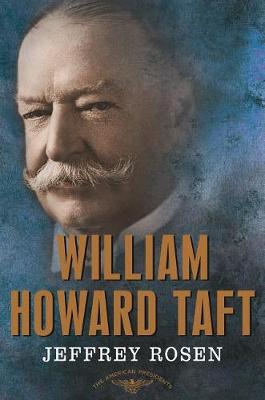American Presidents
1 total work
William Howard Taft never wanted to be president, but won resounding victory in the election of 1908 as Theodore Roosevelt's handpicked successor. The only man to serve as both president and chief justice on the Supreme Court, Taft played a crucial role in shaping how American balances populism against the rule of law. Rosen shows how Taft approached every decision in constitutional terms, defending the Founders' vision of limited government.
"William Howard Taft never wanted to be president and yearned instead to serve as chief justice of the United States. But despite his ambivalence about politics, the former federal judge found success in the executive branch as governor of the Philippines and secretary of war, and he won a resounding victory in the presidential election of 1908 as Theodore Roosevelt's handpicked successor. In office, Taft sought to put Roosevelt's activist executive orders on firm legal ground, but unlike Roosevelt, who thought the president could do anything the Constitution didn't forbid, Taft insisted that he could do only what the Constitution explicitly allowed. This led to a dramatic break between the two men in the historic election of 1912, which Taft viewed as a crusade to defend the Constitution against the demagogic populism of Roosevelt and Woodrow Wilson. Though he lost reelection, Taft achieved a lifelong dream nine years later when President Warren Harding appointed him chief justice. And while he had chafed in the White House as a judicial president, he thrived on the Supreme Court as a presidential chief justice, promoting consensus and transforming the federal judiciary into a modern, independent, and fully equal branch. In this provocative interpretation, Jeffrey Rosen reveals Taft's crucial role in shaping how America balances populism against the rule of law."--Dust jacket.
"William Howard Taft never wanted to be president and yearned instead to serve as chief justice of the United States. But despite his ambivalence about politics, the former federal judge found success in the executive branch as governor of the Philippines and secretary of war, and he won a resounding victory in the presidential election of 1908 as Theodore Roosevelt's handpicked successor. In office, Taft sought to put Roosevelt's activist executive orders on firm legal ground, but unlike Roosevelt, who thought the president could do anything the Constitution didn't forbid, Taft insisted that he could do only what the Constitution explicitly allowed. This led to a dramatic break between the two men in the historic election of 1912, which Taft viewed as a crusade to defend the Constitution against the demagogic populism of Roosevelt and Woodrow Wilson. Though he lost reelection, Taft achieved a lifelong dream nine years later when President Warren Harding appointed him chief justice. And while he had chafed in the White House as a judicial president, he thrived on the Supreme Court as a presidential chief justice, promoting consensus and transforming the federal judiciary into a modern, independent, and fully equal branch. In this provocative interpretation, Jeffrey Rosen reveals Taft's crucial role in shaping how America balances populism against the rule of law."--Dust jacket.
